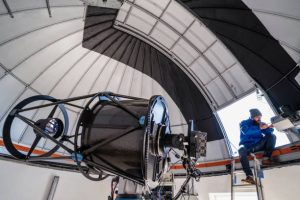| Astronomer Key Stats | |
|---|---|
| Avg. Salary / year | $134,430 |
| Avg. Pay / hour | $64.63 |
| Education | 4+ Years |
| Job Outlook | 10% |
An astronomer studies the skies, seeking to learn about and understand celestial bodies such as galaxies, stars, planets, and solar systems.
If you have an interest in physics, an intense curiosity about the universe, and strong academic skills, then you might like to become an astronomer.
Most astronomers are highly educated and work for colleges as professors, or for other research facilities.
The life of an astronomer is both exciting and intriguing.
A day of work could involve the discovery of new stars and planets, research into the physical laws of the universe, and spending time studying the sky and creating new theories on the world around us.
Go to Page Section:
Education Requirements to Become an Astronomer
The path to become an astronomer is a challenging one.
You will need to prepare yourself for a long span of education; in fact you will likely spend a good part of your career in colleges and libraries.
If you’re still at high school, then you should choose subjects in math and sciences.
Physics is particularly important in this field.
It’s also a good time to start exploring your interests further.
Joining an astronomy club, reading magazines, and broadening your knowledge of the subject are all a good idea.
Most astronomers start their college education with a four year bachelor’s degree, with a major in physics.
Many astronomers are employed as college professors, and to gain this role you will need a doctorate degree.
If you can’t gain entry into a doctoral program after your undergrad degree, you may need to apply for a master’s degree first.
While you’re at graduate school, always offer to help your professors with any field work or research projects they are working on.
It’s good experience, and will also help later on when you conduct your own projects or are looking for employment.
Another career option is to work as a research assistant in an observatory.
To gain this kind of position you would need to complete a master’s degree.
Some astronomers may work for employers like NASA, researching space travel and satellite communication.
A good further source of information on how to become an astronomer is the American Astronomical Society
Astronomer Job Description
When you become an astronomer you could find yourself taking part in a wide range of duties.
Some astronomers work in observatories, where they monitor the sky, look for new stars and planets, and chart the universe.
Others work from a more theoretical perspective.
They try to explain and understand the universe through the laws of physics and mathematics.
Some may work to apply their expertise to aerospace, working to design satellites, as well as air and spacecraft.
Here are some of the tasks of an astronomer:
- Conducting field research
- Collecting, collating, and analyzing data
- Writing and publishing papers
- Conducting research work
- Working on hypotheses, new models, and theories
- Improving observation technology
- Contributing to the design of spacecraft, aircraft, and satellite technology
Astronomer Salary and Career Path
When you become an astronomer, it’s likely that you will begin your career working as a research assistant.
You’ll spend long hours in observatories, and be required to assist others on their field work projects.
If you are completing graduate work, you may be offered work as a teaching assistant or tutor.
Once you have gained some experience, you could be promoted to a more senior position within an observatory.
Alternatively, if you are based in a college, you may be offered a position as a college professor.
Many astronomers may also work for private employers, such as the US Navy, NASA, or other facilities.
Some may conduct their own research by receiving grants from government or not-for-profit organizations.
The median salary for an astronomer is around $87,000 according to BLS.gov.
Those with a doctoral degree were more likely to be on the higher end of the income scale, as opposed to those with a master’s qualification.
Some similar career paths to an astronomer that you might be interested in include:
- Physicist
- College Professor
- Mathematician
- Statistician
- Meteorologist
- Aeronautical Engineer
- Computer Programmer
If you are looking to become an astronomer, you should prepare yourself for a challenging academic path.
You will be rewarded with an intriguing career, where your work life will present you with all different kinds of challenges and situations.
There is also the rare opportunity to contribute something original to human knowledge.
![]() The below information is based on the 2024 BLS national averages.
The below information is based on the 2024 BLS national averages.
National Average Salary
$134,430Average Salary by State
| State | Avg. Annual Salary |
|---|---|
| Arizona | $131,990 |
| California | $141,660 |
| Hawaii | $98,800 |
| Maryland | $153,000 |
| Massachusetts | $156,870 |
| Washington | $117,600 |
The highest-paying state in this field is Massachusetts, with an average salary of $156,870.
Here are the five states with the highest salaries in the field:
* Employment conditions in your area may vary.
Frequently Asked Questions
What does an astronomer do?
Astronomers are scientists who focus on the study of space (the stars, galaxies, and planets above us) and its evolution.
There is a wide range of fields in astronomy; in most cases, a scientist chooses to specialize in one of them (galactic astronomy, planetary astronomy, stellar astronomy, solar astronomy, cosmology or extragalactic astronomy).
Within every field, there are two different branches of study – the theoretical type and the observational type.
The theoretical type describes astronomical phenomena and objects with the help of analytical or computer models, while the observational branch is focused on acquiring and analyzing data with the help of the basic principles of physics.
The typical duties of an astronomer include carrying out his or her research; testing theories; running numerical models; observing space; reading publications, and so on.
How much do astronomers make?
On average, an astronomer can make a little less than $106.000 per year in the United States.
In case you decide to follow this career path, you can expect to earn anywhere between $57.000 and $166.000 annually.
The salary would certainly depend on a variety of factors – your education and experience level, the employer, the location and so on.
The astronomers that work in California and the District of Columbia, for example, have the highest average salaries.
An entry-level astronomer can earn $27 per hour, while a specialist with plenty of experience will make $80 and more.
How much does it cost to become an astronomer?
You would certainly need to obtain at least a bachelor’s degree in physics or astronomy (some universities offer a degree specialization in astrophysics), in order to become an astronomer.
A year in a university can cost you anywhere between $8.000 and $45.000 (and more); the cost depends on a variety of factors (the books, supplies, and accommodation expenses are not included).
The majority of employers would expect you to have a master’s degree in astronomy or physics (between $30.000 and $120.000) or a doctorate degree (around $30.000 per year).
A Ph.D. is a must if you want to teach or conduct independent research.
What is the demand for astronomers?
Between 2016 and 2026, the astronomer and physicist job markets are expected to grow by 10%, according to the Bureau of Labor Statistics.
That is a little faster than the national average for all occupations in the United States.
The number of positions is, in most cases, limited by the federal budget.
Job opportunities will be best for those candidates who possess a master’s degree or a Ph.D.
Astronomers with a doctorate degree can work as university professors or in banking and finance.
How long does it take to become an astronomer?
It will take you 4 years to obtain a bachelor’s degree, 2-3 years to acquire a master’s degree, and anywhere between 4 and 6 years to earn a Ph.D.
The sooner you determine what area of astronomy you want to focus on, the better.
Those with a Ph.D. can qualify for university research positions.
You can also choose to join some professional associations (the American Astronomical Society, for example).














